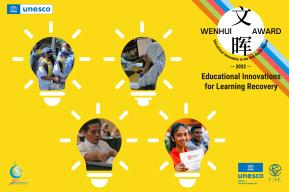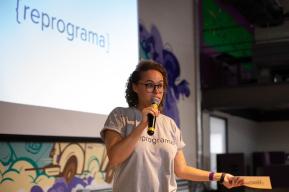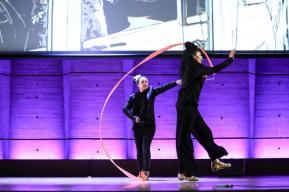News
UNESCO launches online course fostering inclusive, equitable and quality education in Myanmar
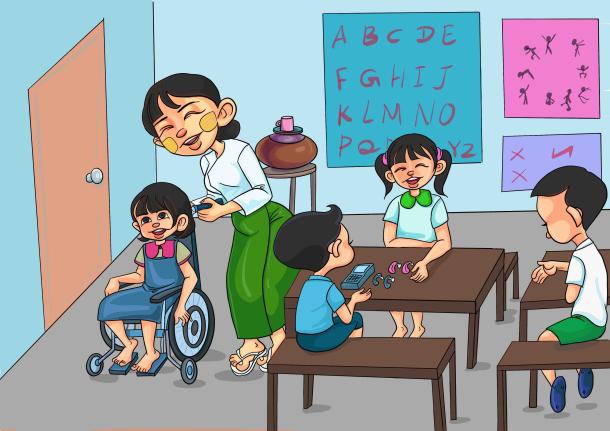
To address prevailing challenges facing Myanmar teachers in meeting the educational needs of children living with disabilities, and to assist in upholding the educational rights of these children, UNESCO has launched an Inclusive Education online course on the Myanmar Teacher Platform.
Aiming to contribute to Myanmar teachers’ professional development, the course, ‘Inclusive Education’, is composed of three modules:
- Disability and Inclusive Education
- Inclusive Education for Children with Physical Impairment
- Inclusive Education for Children with Intellectual Impairment
The primary objective of the course is to enhance teachers' understanding and abilities in supporting children with disabilities within mainstream schools. The need for such a course is readily attested by current challenges facing teachers in meeting the educational needs of a population with special needs in Myanmar’s collective state and regional areas, currently home to 2.3 million people living with disabilities.
In recognition of the diverse nature of impairments among the population of disabled children in Myanmar, the course emphasizes various approaches and techniques to assist children with disabilities in regular classrooms. Its design aims to eliminate barriers and bolster the support for children with physical and intellectual impairments by focusing on teacher professional development. This includes teacher training on curriculum preparation; creating teaching materials; practicing effective communication with these children; and optimizing the learning environment.
Disability in Myanmar(2014-2019) revealed that only 36 percent of children aged between 5-9 can read and write. Additionally, a 2016 UNICEF situational analysis reported that 67 per cent of children with disabilities were not enrolled in schools, a rate significantly higher than their abled peers.
There are distinct reasons for this discrepancy. For one, attitudinal barriers impede the admission of children with disabilities to mainstream schools, due to a common perception that such students cannot learn as well as others. Another challenge, and a significant one, is the lack of teacher capacity development in this specialized area.
Featuring interactive learning, course lessons offer a diverse array of elements, such as the activity, ‘Have you have ever seen and taught a child with Down’s syndrome in your classroom?’, in which the teacher must respond actively; other components feature video lessons with key message description; quizzes; and learning from case studies. This multi-faceted approach not only deepens teachers’ comprehensive understanding of the materials, but also promotes interactive learning for their ongoing professional development.
Since it was launched in November 2023, the inclusive education module of the course has been taken up by 216 teachers, among whom 140 have already received their completion certificates. Teachers are eligible to receive the certificate upon successfully achieving a score of 80 per cent or higher in the final assessment.
Feedback from participants, to date, underscores the positive attitudes and practical knowledge among teachers regarding the right to education, and their enthusiasm for eliminating barriers within their learning environments.
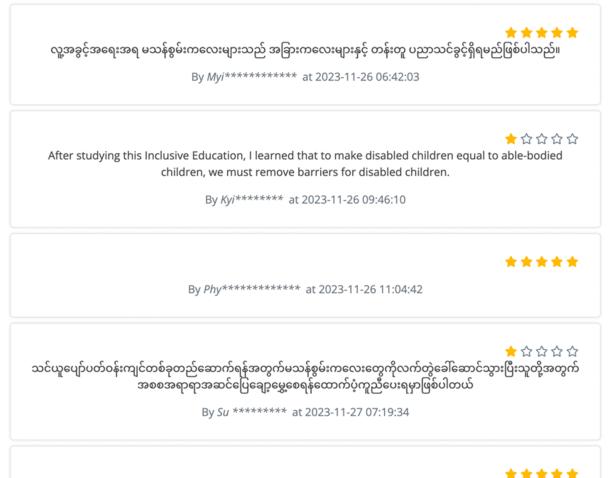
Among the many appreciative comments recently offered by course takers are the following:
- ‘According to the human rights, children with disabilities have a right to education equally with other children without disabilities.’
- ‘After studying this Inclusive Education, I learned that to help children with disabilities to attain equality with able-bodied children, we must remove barriers for disabled children.’
- ‘To transform our school into a more child-friendly one, it is essential to facilitate the inclusion of children with disabilities, ensuring their equal participation.’
- ‘Expanding disability awareness sessions to reach the public is essential for reducing attitudinal barriers. This effort aims to ensure that children with disabilities have an equal right to education.’
- ‘The systematic implementation and application of inclusive education are crucial steps towards achieving comprehensive educational coverage.’
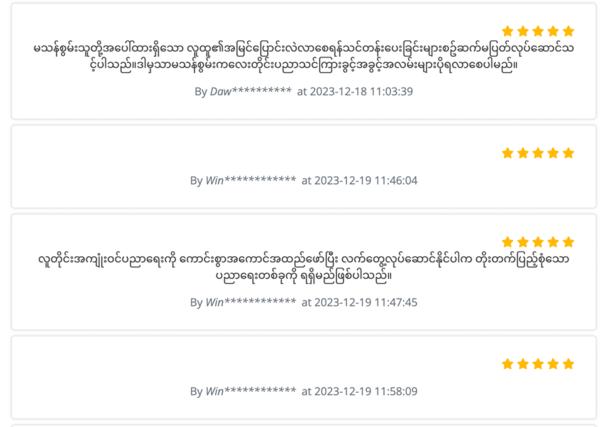
Organizations seeking deeper insights may request further in-depth study with education professionals by submitting an online training request form after receiving their certificates. To date, roughly 117 teachers (101 female and 16 male) have actively participated the virtual training sessions. After completion the course, teachers further gain access to a virtual professional learning community through a private Facebook group fostering ongoing support with regular professional updates, digital content, and quizzes to enhance teachers’ continual professional development.
- The recent initiative by the UNESCO Project Office in Yangon positions teachers as pivotal figures in the integration of psychosocial support into education. As the programme advances, these educators are anticipated to play a crucial role in championing inclusive education for children with disabilities in Myanmar.
- The UNESCO Antenna Office in Yangon invites both organizations and educators to participate in this transformative movement, aiming to secure a brighter and more resilient future for Myanmar's educational landscape.
- For access to Inclusive Education online courses, learn more at the Myanmar Teacher Platform.
- Click here to visit Module 1, Module 2 and Module 3 of the course.
For further information, kindly contact: training.myanmar(at)unesco.org
By Equity and Inclusion Team, Strengthening Pre-service Teacher Education in Myanmar Project, UNESCO Antenna Office in Yangon
#TeacherEducationMyanmar






